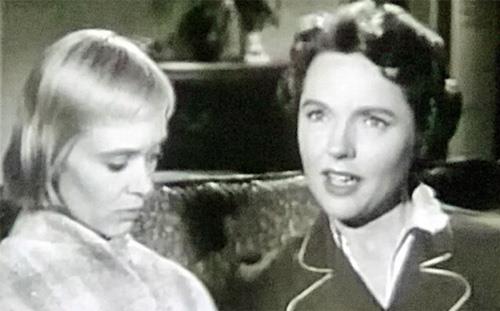
This year of perpetual punishments has many of us looking back on simpler, more innocent times (like 2019). But I've been looking way back, of late, finding blessed relief in shows (especially situation comedies) from the distant past that sought to do nothing more than entertain us and maybe toss in a gentle lesson or two that would prove in the decades that followed to be timeless. For me, at this point in time, no show does that better than Father Knows Best, a relic, as it were, from the Fifties. This enduring light comedy, which revolves around the daily activities of the Anderson family, became my pandemic TV comfort content while the world around me went to hell.
Today, everything about the lives of the Andersons seems utterly alien, as if I am watching daily transmissions from another dimension. (In reality, I watch the show on Antenna TV, which is one of those increasingly invaluable television services that serve as archives of classic American television programming.) Father Knows Best may be dated in many ways, but the simple messaging about kindness, compassion, and common sense in most of the episodes continues to resonate to this day.
This brings me to the headline of this column. Perhaps the dad of the title, businessman Jim Anderson, always knew best, but his wife Margaret was no slouch in the parenting department, either. Yes, she was poised and perhaps preternaturally perfect in every episode (like many TV moms of that era). If Jim was the dad everyone wanted, Margaret was likely the world-class mom most of us idealized. (I wonder what real-life moms thought of her at the time?)
Margaret may have been flawless, but there was one amazing episode that gave her an edge and made her, dare I say, real. When I caught it recently, it stopped me in my tracks. Jim and the kids were driving her crazy, and when she had enough, she let them all have it – not in one scene, but throughout the entire story. The title of the episode, first telecast on May 22, 1957, says it all: "Margaret Disowns Her Family."
Now, of course, Margaret would never think of doing such a thing. She just saw fit to administer a little justifiable discipline in response to cascading thoughtless behavior from her loved ones. But she was so firm that she inadvertently spooked a young pregnant woman named Esther Garvin (top, left), who had stopped by the Anderson home with her husband Walt to purchase a used crib. (Side note: Esther was played by Christine White, who would later co-star opposite William Shatner in one of the most famous Twilight Zone episodes in the history of that show, "Nightmare at 20,000 Feet.")
Esther was so disturbed by Margaret's distress that she began to believe that starting a family was a huge mistake. The poor woman was deeply depressed until Margaret took the time to explain herself.
Call me a cheeseball, but I think the following monologue that was given to actress Jane Wyatt (top, right) says more about motherhood and family life than anything I have heard in any other television series ever.
"I don't know what you heard me say to my children, but these are just the eternal little gripes of every mother," she began, speaking about the day's annoyances. "There are times when you almost feel like disowning them, but we might as well face it: Raising a family is no simple bed of roses. It takes a lot of hard work. Tell me this, Mrs. Garvin. Can you tell me one thing – one worthwhile thing – that doesn't take a lot of hard work? Believe me, I know of nothing more worthwhile than a family. Oh, you can get irritated, picking up your boy's jacket a thousand times, but what if you didn't have that boy to pick up the jacket for? You can get a little mad at your husband for barricading himself behind his newspaper at the breakfast table, but you just try eating breakfast without him there. These little irritations are all forgotten during those wonderful moments when you see your children begin to develop into people, the kind of people that you want them to be. Their triumphs at school. Awkward gestures of affection. Their demonstrations of moral courage, and fairness, and goodwill. The warm feeling that fills your heart at those times you couldn't buy for a billion dollars. There are good times and bad times, but you'll need them both. It's from the bad times that you learn. You'll find that your family has good points and bad points, and you love them for both. In fact, I think it's people's shortcomings, not their strengths, that bind them together. So, the thing to do is to muster up all your faith and your energy, your courage, whatever you have, and plunge head-on into the demanding, difficult, but the most fulfilling and wonderful job in the world."
I imagine this episode had quite an impact 62 years ago. It still hits the right notes today.
By the way, there were 37 episodes in that third season of Father Knows Best. This was No. 35. Can you imagine a time when producers, writers, directors, actors, and crews turned out 37 original episodes of a primetime television series every season?
Me neither.
A version of this column first appeared in the TV/Video Download channel at MediaVillage.com.